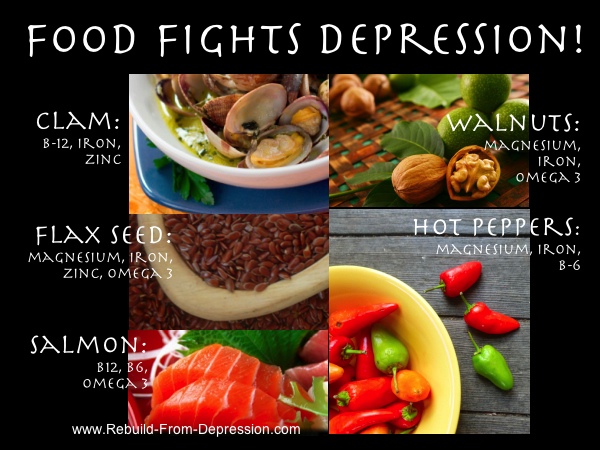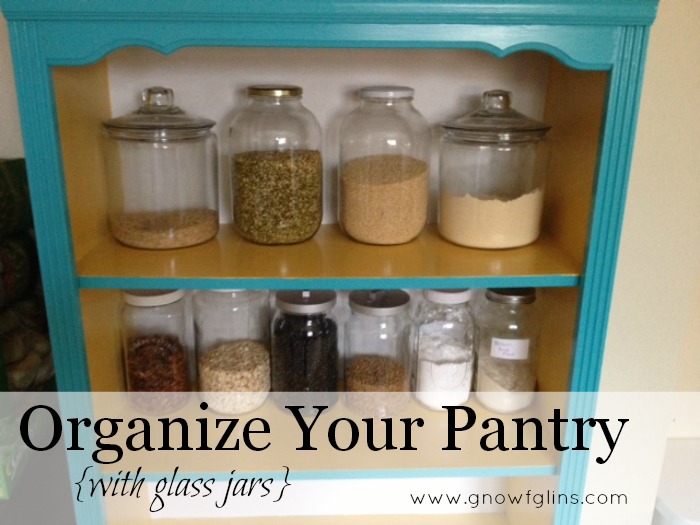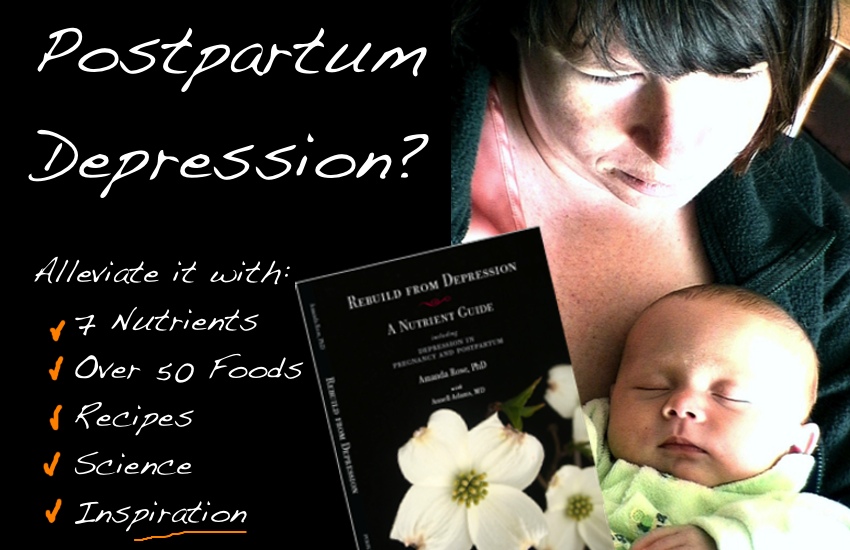
In this episode of Know Your Food with Wardee, you’ll meet Amanda Rose. She authored the book Rebuild From Depression: A Nutrient Guide after her experience of severe postpartum depression in her first pregnancy. In the book, she argues that food nutrients are a key cause of depression and provides tools for correcting them. Notably, Amanda had a second baby after writing the book and managed to stay depression-free. I’ve invited Amanda here to talk about the best depression-fighting foods.
Get to know Amanda, her family, and her work through the links and information below, and of course through this podcast. Plus… the tip of the week!
Podcast: Play in new window | Download
Subscribe: RSS
Won’t play for you? Try here. Mobile or desktop users, you can hear my podcast with Stitcher, on-demand and on-the-go. (What’s Stitcher?) You can also get it on iTunes or subscribe in the Podcasts app.
Tip of the Week: Organize Your Pantry… with Glass Jars!
It’s a new year and often we think about what we can improve! So, might I suggest some pantry organization… and prettification? That’s right — make it pretty with glass jars! Here’s how to get started in two easy steps!
About Amanda Rose and Rebuild From Depression
Amanda Rose, Ph.D. is the author of the book Rebuild From Depression: A Nutrient Guide, a book on food and depression that she wrote some years after the birth of her first son and the serious depression she suffered in that pregnancy and postpartum. The book was in press when she discovered she was pregnant again. Against the odds, she remained depression-free using a variety of brain-supporting tools, now part of her Good Day Strategies approach found free online. Find Amanda and two other Rose generations writing at FreshBitesDaily.com from their five acres in California’s Sequoia National Forest.
In Rebuild from Depression: A Nutrient Guide, Including Depression in Pregnancy and Postpartum, Amanda Rose, Ph.D. and Annell Adams, M.D. identify the seven nutrients most commonly associated with depression in the medical literature. They provide readers with tools to:
(1) Identify a nutrient deficiency
(2) Locate the best supplements, and
(3) Select and prepare foods to maximize those nutrients in their diet.
The depression book opens with Amanda’s biography of depression and psychosis. She makes a compelling claim: “My grandmother died at the age of sixty-one from complications of postpartum depression.” Amanda argues that her grandmother showed signs of nutrient deficiencies in her 20s, did not correct them, and suffered a life of depression, diabetes, and heart disease, all of which share a common nutrient deficiency: Omega 3 fatty acids.
Use the book to fight depression with:
- 7 nutrients
- 50+ foods
- recipes
- science
- inspiration
The depression book describes the research basis for the nutrient-depression link, highlighting the nutrients with the strongest basis in research. With seven specific nutrients in mind, the authors review each of the food groups recommending how to improve the diet for the long-term. Which meats are highest in Omega 3 fatty acids? How do you select oils to improve your Omega 3 status? Should you trim your steak?
In a unique contribution to work on depression, the authors present “depression buster foods” — those foods highest in the seven focus nutrients. The Rebuild book is the only depression book of its kind to identify criteria for depression-fighting foods and apply that criteria systematically to the USDA’s database of over 5,000 foods.
Podcast: Play in new window | Download
Subscribe: RSS
Links Mentioned
- Good Day Strategies — free email series plus info about Amanda’s book and special packages
- Rebuild From Depression — the book on Amazon
- Fight Depression, Eat a Burger — blog post
- Amanda on Facebook (Traditional Foods)
- Amanda on Pinterest (Fresh Bites Daily)
- Amanda on Instagram (@freshbitesdaily)
iTunes
I’m so grateful when you visit my show on iTunes and leave a rating and/or review! KnowYourFoodPodcast.com/iTunes This helps me make my podcast better and also helps others find it. Thank you! For past or current episodes, check out the Know Your Food with Wardee podcast archives.
Anything to Add?
I would love to hear from you! Do you have questions for Amanda or comments about anything shared in this episode? Like this podcast? Please help me reach others by using the share buttons at the top of this post. Thanks!
We only recommend products and services we wholeheartedly endorse. This post may contain special links through which we earn a small commission if you make a purchase (though your price is the same).





Thank you for this wonderful podcast. What a positive way to start off the new year. I, myself, have had a life filled with tremendous trauma, some of which is ongoing and beyond my control. As I’ve sought for answers that are not available at this time I was going further and further down the rabbit hole of depression, anxiety and discouragement. I’ve chosen 2 words for 2014: positive and organized. Amanda has provided wonderful resources for those of us whom suffer. Thank you for these resources and in helping me with my goal of being positive!
I’ll have to eat salmon more often. I have flax seed in my cupboard but I rarely find uses for it. I have to look for some ideas.
I have fish and egg allergies and would also love to do more with Flax. Learning how to use Flax as an egg replacer in baking would be great!
I like freshly ground flaxseed on my oatmeal for breakfast but have to watch that I don’t over do it or I need to take a laxative as it seems to dry up fast. Heard say that flax needs a lot of water. I like the nutty flavor of flax. Or, I like carrot juice with freshly ground flaxseed and cinnamon and maybe some more herbs and/or spices as I prefer.
I enjoyed the podcast with Wardee and Amanda! I have a question about determining the quality of the beef you buy. I have been buying beef from my farmer father for years and years. It is grass fed and he doesn’t use any artificial hormones. Unfortunately the beef is “grain finished”. I know you can’t give me an official, definitive answer, but what would *you* choose. Grass-fed, grain-finished, local (literally in my backyard) beef or organic, grassfed beef from Target? Thanks for your time. Rhonda Brougher
I can appreciate what Amanda has experienced, and I must confess that I have not read her book and do not know the whole story, but from what I gather she is right on with her assessment of deficiency in amino acids and omega-3’s.
I am a 30 year survivor of suicidal depression and my body is still healing from nutritional deficiency.
I want to warn those that are in the throws of severe depression to realize that food is not enough at first when there is a realization of what is happening. Mild depression is, of course, a different story.
Intensive, targeted amino acid therapy is the answer to jumpstart a body that is critically depleted.
There are companies out there that specialize in severe cases and it truly works. One such company truly saved my life-food changes simply were not enough.
Just thought I would let my thoughts be known.